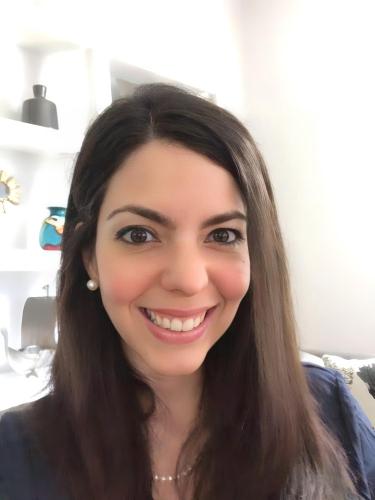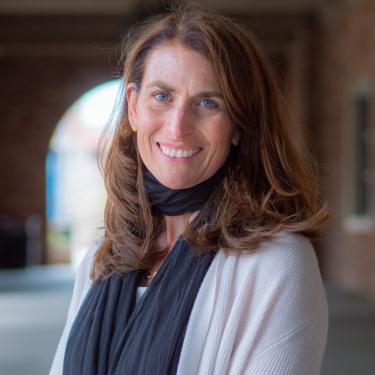Moms helping moms: Postpartum depression eased through peer support
Alma program peer mentors Gracia Deras, left, and Shannon Beckner sit with baby Wyatt. Deras experienced postpartum depression with her first child and now helps other moms navigate their own mental health struggles.
Gracia Deras had just delivered her first child when the dark cloud that had nagged her during pregnancy began to overtake her.
She lacked the energy to care for herself—much less her newborn son—and her husband at the time was not supportive. Ashamed to feel depressed when she was expected to feel joyful, she folded inward: She skipped church, ignored her phone and hid in bed when visitors knocked at her door. At times her thoughts terrified her.
“I felt like I lost all hope in my ability to be a mother,” recalls Deras, who—at the advice of her pediatrician—sought therapy when her son was a few months old.
A decade later, Deras serves as a peer mentor for Alma, an eight-week CU Boulder-born program that pairs new moms struggling with mental health issues with trained peers who have been through it and come out the other side.
New research published in the journal Behavior Therapy shows that the program—which has served nearly 800 moms—provides “rapid relief of symptoms” and “significant clinical improvement” to a population that has historically faced barriers to mental health care.
Another new paper, published this week, suggests that new moms nationwide are not only open to but hungry for peer-support. With expansions in New Jersey and California underway, Alma now aims to go nationwide.
“My vision is that every mom who is feeling anxious, stressed and overwhelmed knows that she’s not alone and has access to the support she needs,” said program founder Sona Dimidjian, a professor in the Department of Psychology and Neuroscience at CU Boulder.
An unmet need
About one in five U.S. women experience perinatal mental health challenges—including depression and anxiety that can begin during pregnancy and last a year after a child is born.
Stigma prevents many from seeking help. When they do, trained clinicians are hard to find, wait lists are long and the expense is often prohibitive.

Anahi Collado
Due to language and cultural barriers that can make them feel isolated, new Latina moms are at particularly high risk, with nearly half experiencing postpartum depression. Yet the number of facilities providing therapy in Spanish has declined by 18% in recent years, research shows.
“Friends and family are well-meaning, and they try to offer support but sometimes it is hard for them to know how to help,” said Anahi Collado, an assistant research professor who trains peer mentors for Alma.
Dimidjian launched the program in 2016, inspired by research she and colleagues had conducted in India and published in The Lancet that year. They found that when depressed patients saw “lay counselors”—specially trained community members with no formal mental health education—for three months, they had fewer symptoms and missed less work. Sixty-four percent experienced remission from depression.
“There are not enough licensed mental health providers to meet the need,” said Dimidjian, who sees peer support as a critical tool for addressing a national shortage. Another benefit: “All of our communities are stronger when mothers support one another and learn from each other’s wisdom and expertise.”
Change your actions; change your feelings
Alma peer mentors receive 80 hours of training based on an evidence-based approach called “behavioral activation,” which hinges on the simple notion that changing what you do can change how you feel. Peers meet with moms in person or remotely six to 10 times, helping them to: identify what makes them feel good; pinpoint what’s keeping them from it; learn to ask for help; and intentionally build those activities into their day.
Something as simple as a hot shower or walk around the block can be key, said Collado.
“Sometimes when we’re feeling depressed, we stop doing the things we used to enjoy, and we start doing things that end up maintaining that depression. Alma empowers moms to break the cycle,” she said.
For one new study, published in March, she administered questionnaires to 126 Spanish-speaking Latina mothers in the program, assessing their symptoms at nine points.
Within two meetings, moms saw their depression decline significantly. Half of participants reported significant reductions in anxiety and more than a third felt less stressed. The more activities moms did, the more they improved.
For another study, researchers surveyed 674 new and expectant Latina moms nationwide about the idea of peer-led mental health support. More than 89% said that, compared with working with a mental health professional, working with a peer would make them feel less isolated and more understood.

Sona Dimidjian
All of our communities are stronger when mothers support one another and learn from each other’s wisdom and expertise.”
“These findings add to the growing evidence base for using peer-support programs to address perinatal depression,” said Collado, the study’s first author.
Paying it forward
With such findings in mind, Alma is already working with nonprofits and community organizations in New Jersey, California and across the State of Colorado to expand the program in both English and Spanish. It is currently provided at low or no cost to participants.
Collado stresses that peer mentors are not meant to replace clinicians and, in fact, often refers moms to licensed mental health providers if they have more serious mental health problems like PTSD or suicidal ideation.
“Alma is not therapy,” she said. “But it can be a critical bridge to other mental health care that a mom might need and wouldn’t otherwise get.”
Deras, now a proud mom of two boys, credits therapy for getting her through her own rough patch. But she also credits her sister, who held her baby so she could shower, put on makeup and go back to church.
As an Alma mentor, she is now paying it forward.
“It is so gratifying to give back to these moms now,” she said. “I know what they are going through.”


